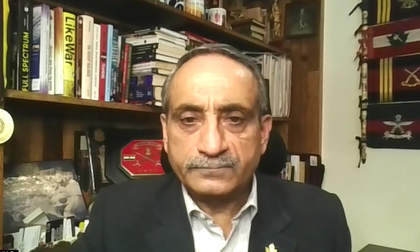'Operation Sindoor' befitting response to 'Modi ko bata dena' challenge, says retired Indian Army Lt Gen
By IANS | Updated: May 10, 2025 10:37 IST2025-05-10T10:34:01+5:302025-05-10T10:37:39+5:30
New Delhi, May 10 Retired Lieutenant General, Satish Dua, stated on Saturday that the Pahalgam attack, where terrorists ...

'Operation Sindoor' befitting response to 'Modi ko bata dena' challenge, says retired Indian Army Lt Gen
New Delhi, May 10 Retired Lieutenant General, Satish Dua, stated on Saturday that the Pahalgam attack, where terrorists boldly declared “Modi ko bata dena (Go tell Modi)", became a turning point in India’s response to cross-border terrorism that was delivered in the aftermath of the massacre of innocent people.
In an interview with IANS, Lt Gen (Retd) Dua remarked, “They said ‘Modi ko bata dena,’ everyone heard it. That one sentence became so famous.
"At the time, Prime Minister Narendra Modi was on an official visit to Saudi Arabia. He heard about it while he was there, cut short his visit and returned immediately."
"A high-level meeting was held, and the steps that had to be taken were announced by him. PM Modi heard them, and that is why, just 14 days later, something unprecedented happened which never happened before,” he said, referring to the decisive action taken by India.
He highlighted the significance of the strikes that followed. “Jaish-e-Mohammed’s headquarter in Bahawalpur was destroyed. The Lashkar-e-Taiba HQ in Muridke, just 30 km from Lahore, both cities have Pakistani Corps HQs, which were targeted. If we can strike those locations, it shows our capabilities, there's a hidden message in it. That message is well understood by Pakistan and its military.”
On whether Pakistan has learnt its lesson, Lt Gen Dua remained skeptical. “Pakistan never stops its misadventures. Despite defeats in 1947-48, 1965, and most notably in 1971, where we split their country and 93,000 soldiers surrendered in a formal ceremony, something unseen since World War II, they still spin it as a victory in their internal narrative,” he remarked.
He added that after those defeats, Pakistan turned to proxy warfare. “I don’t think Pakistan learns its lesson. But yes, for the first time, we’ve touched on the issue of water, a tool we had never used before despite several wars and the Kargil conflict, because it impacts the common Pakistani citizens.”
He emphasized the impact of this new strategy, stating, “The effects of the water issue will soon be far more telling than any kinetic or non-kinetic response. We just have to wait and watch if they still refuse to learn.”
Lt Gen Dua highlighted the deep-rooted anti-India sentiment in Pakistan’s military. “Pakistan’s army is built on India-hating. They’ve built an empire for themselves beyond military duties, and they won’t give that up. Kashmir is the glue that holds them together. With internal unrest, Baloch, Pashtun, TTP, economic collapse, and public anger, they use India bashing as their only salvation. The army hopes this will rally people behind them despite their failures.”
Disclaimer: This post has been auto-published from an agency feed without any modifications to the text and has not been reviewed by an editor
Open in app